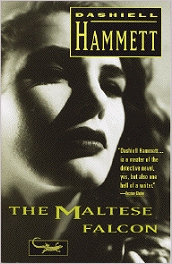 |
The Maltese FalconDashiell Hammett |
|---|
 |
The Maltese FalconDashiell Hammett |
|---|
The first writer who was legitimately and literately hard-boiled without being anything else was Dashiell Hammett, whose tough-sounding mysteries were intended as a challenge to the genteel, formula-ridden puzzle stories of the British crime school. He wrote for mood and character rather than for story--the solution was often less important than atmosphere. Hammett had only ten fruitful years as a writer, from the mid-twenties to the mid-thirties; but in that time, in his stories for Black Mask starring The Continental Op, and in his famous novels, he built a solid reputation as the Ernest Hemingway of the pulps.
First serialized in Black Mask in 1929, The Maltese Falcon (1930), contains the most pungent of all the hard-boiled characters--Sam Spade--and through him becomes a kind of informal essay on the code of the tough guy. Two famous speeches in the novel reveal the essence of that code. Early in the story, Sam Spade, in what is for him an expansive mood, recites an anecdote to Brigid O'Shaughnessy about a man named Flitcraft. One day, while walking to work, Flintcraft is nearly hit by a falling beam. The near accident gives him a sense of the randomness and absurdity of life; he decides to walk away from the safe, contained life of work, family, and responsibilites he has created for himself. "It was not, primarily, the injustice of it that disturbed him: he accepted that after the first shock. What disturbed him was the discovery that in sensibly ordering his affairs he had got out of step, and not into step, with life."
The Flintcraft episode is extraordinary for a number of reasons. This richly suggestive allegory, which seems oddly placed in a crime story, is indicative of Hammett's uncoventional methods. Supplying mood and philosophical context, and conveying a sense of Spade's measured, wary character, the story does not advance the narrative in any direct way--Hammett's inclusion of it moves The Maltese Falcon toward literature and away from pulp fiction.
Spade's speech to Brigid at the end is equally trenchant in its revelation of character. Spade tells Brigid that he has been wise to her from the beginning. The jig is up, he announces, as she attempts to work her female magic on him. Though Sam is attracted to her, charmed by the skill of her performance, he is not going to protect her. He is not going to violate his code for her. "When a man's partner is killed," he says, in a speech that typifies the clipped, terse tone he always adopts, "he's supposed to do something about it. It soesn't make any difference what you thought of him. He was your partner and you're supposed to do something about it . . ."
These two beautifully written passages, the Flintcraft story and the explanation to Brigid, summarize the moral foundation of the hard-boiled code. In the face of uncertainty and duplicity, Sam Spade retains his honor. He is not lily-white by any means--he had an affair with his partner's wife, he is not above using deception and violence to gain his ends. He is cynical and hard to reach emotionally. But, like Flintcraft, he endures, held together by an inner toughness. He commands respect. He is, in short, an ideal character for Humphrey Bogart, the quintessential noir actor.
Of its kind, The Maltese Falcon is supreme--it maintains a perfect pitch throughout--but nothing else in the cannon comes anywhere near the same level of performance. Hammett knew his own limits, as well as those of the genre in which he worked, and he surely would have scoffed at high-toned re-appraisals that make him a writer of the first rank, co-equal with Hemingway, or that attempt deep readings of material never intended to be more than intelligent, finely crafted entertainment.
Warner Brothers paid $8,500 for the movie rights to the Falcon but were only able to muster a pair of forgettable "B" pictures. In 1940, when screenwriter John Huston told Jack Warner that he wanted to remake The Maltese Falcon (1941) as his directorial debut, he and screenwriter Allen Rivkin decided not to tinker with a good thing: the director's secratary broke the novel down into script form without any major changes, and Huston sent it to the big boss for approval. Although he'd twice demanded tangled reworkings of the same material, Warner now inexplicably commended Huston on "a great script."
--FOSTER HIRSCH, from Film Noir
The Dark Side of the Screen.
A selection of Maltese Falcon related fiction.
|
Find Maltese Falcon on eBay.com
A selection of Maltese Falcon non-fiction.
|
|
home: The Film Noir 'net |
back to: NOIR LITERATURE |
|
Any comments, additions or suggestions
should be addressed to: The Film Noir 'net / Eric B. Olsen / ericbolsen@juno.com |
Other Web Sites:
History of Horror Hard Bop Homepage The War Film Web Author Eric B. Olsen |